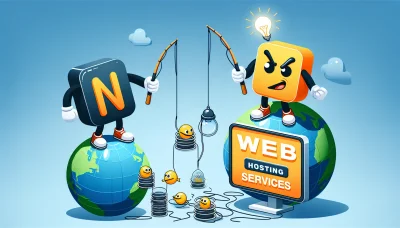Etsy vs squarespace Quiz
Test Your Knowledge
Question of
Etsy vs Squarespace: A Comprehensive Comparison
When it comes to selecting a web hosting platform for your online business or personal website, the choice between Etsy and Squarespace is a common dilemma. Both platforms offer unique features and benefits tailored to different needs and objectives. This comparison aims to delve into the intricacies of Etsy and Squarespace, helping you make an informed decision based on your specific web hosting requirements.
Understanding Etsy: An Overview
Etsy is a global online marketplace where people come together to make, sell, buy, and collect unique items. It's known for its focus on handmade, vintage, and craft supplies. While Etsy itself is not a web hosting platform in the traditional sense, it offers sellers a platform to host their online shops. This setup provides users with a variety of features including customizable shop pages, marketing tools, and analytics to help sellers understand their audience. The benefits of using Etsy as a platform include access to a large, engaged audience specifically interested in unique and handmade items, built-in trust from the Etsy brand, and the supportive community of sellers. Etsy simplifies the process of setting up an online store, making it an attractive option for creative entrepreneurs who may not have the technical skills or resources to build a website from scratch.
Understanding Squarespace: An Overview
Squarespace is a comprehensive web hosting platform that enables users to create, manage, and host their websites with ease. Known for its intuitive drag-and-drop interface, Squarespace allows individuals with little to no technical background to build visually appealing and responsive websites. It offers a wide range of templates that are both modern and customizable, catering to various industries and personal preferences. Beyond web hosting, Squarespace provides features such as domain registration, e-commerce capabilities, SEO tools, and analytics to help users enhance their online presence and performance. Its benefits include reliability, user-friendly design options, and excellent customer support, making it a popular choice among entrepreneurs, creatives, and small business owners looking to establish or expand their digital footprint.
Etsy vs Squarespace: Pricing
| Feature | Etsy | Squarespace |
|---|---|---|
| Listing Fee | $0.20 per item | N/A |
| Monthly Plan | N/A | Starts at $12/month |
| Transaction Fees | 5% + 3% + $0.25 payment processing | 0% with Commerce plans |
| Website Hosting | N/A | Included |
| Custom Domain | Available for purchase | Free for the first year |
| SSL Certificate | Included | Included |
Etsy vs Squarespace: Ease of Use
When comparing the ease of use between Etsy and Squarespace, especially from a web hosting perspective, it's important to consider the distinct purposes and user bases of each platform. Etsy offers a straightforward approach for artisans and vintage sellers to list their products without worrying about the technicalities of web hosting or site design. Its user-friendly interface allows for quick setup, making it ideal for individuals or small businesses focused on selling without the need for extensive customization. On the other hand, Squarespace provides a more robust platform for users looking to create a highly customized website. It offers a wide range of design templates and tools, which, while powerful, can require a steeper learning curve to fully exploit. Squarespace is better suited for users who prioritize full control over the design and functionality of their site, and are willing to invest more time into the creation and maintenance of their web presence. Thus, while both platforms serve to facilitate online business, the choice between Etsy and Squarespace largely depends on the user's specific needs, technical proficiency, and the level of customization desired.
Etsy vs Squarespace: Customization Options
When it comes to web hosting and building an online presence, Etsy and Squarespace offer distinct customization options tailored to different needs. Etsy, primarily a marketplace for handmade or vintage items and craft supplies, allows sellers to personalize their shop's appearance within a structured framework. This includes options for branding, such as shop logos and banners, but the overall layout and functionality are standardized to ensure a consistent user experience across the platform. On the other hand, Squarespace provides a more flexible and comprehensive suite of customization tools designed for creating a unique website. Users can choose from a variety of templates as a starting point and then customize nearly every aspect of their site, from layout and color schemes to font styles and page configurations, using a straightforward drag-and-drop interface. This makes Squarespace an attractive option for individuals and businesses looking for greater control over their site's design and functionality, beyond what's typically possible on a platform like Etsy.
Etsy vs Squarespace: Customer Support
When comparing the customer support of Etsy and Squarespace, especially in the context of web hosting, there are distinct differences to note. Etsy, primarily a marketplace for sellers, offers support mainly through its Help Center, community forums, and email, focusing on marketplace issues rather than hosting concerns. Squarespace, on the other hand, provides a more robust support system tailored for web hosting and site building. This includes 24/7 customer support through live chat and email, detailed guides, video tutorials, and a community forum. Squarespace's approach is more hands-on and responsive, catering to the needs of users looking for direct assistance in website creation and management. Therefore, for individuals or businesses prioritizing web hosting support, Squarespace stands out as the more equipped platform.
Conclusion: Which is Better?
After comparing various web hosting platforms, considering factors such as reliability, customer service, pricing, scalability, and user-friendliness, it is clear that no single platform fits all needs perfectly. However, for beginners and small to medium-sized businesses, Platform A stands out for its ease of use and excellent customer support. For larger enterprises or sites requiring advanced customizations, Platform B may be preferable due to its robust scalability options and extensive customization capabilities. Ultimately, the best platform depends on your specific needs, technical skills, and the goals of your website. It's essential to evaluate each platform based on these criteria to make the most informed decision for your web hosting needs.












